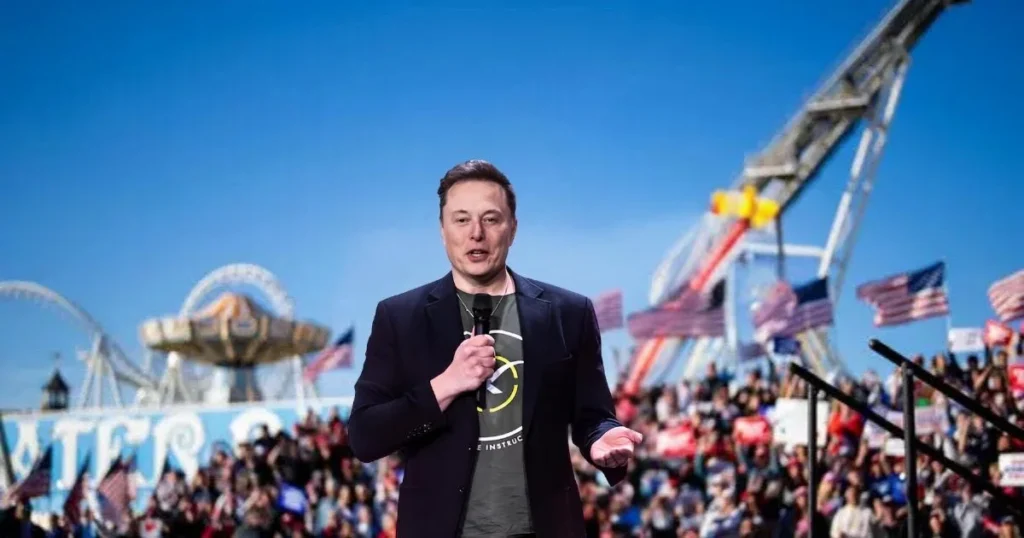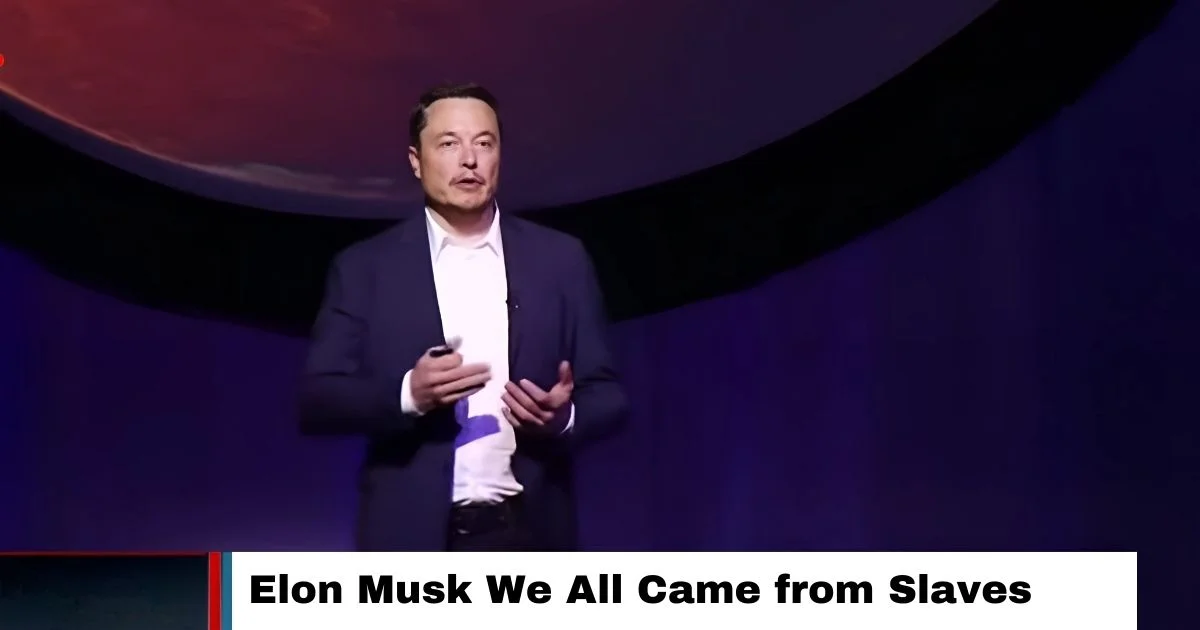When Elon Musk made the statement, “we all came from slaves,” it ignited a wave of discussion that transcends mere semantics and delves into the intricacies of human history, privilege, and our shared identities. This powerful assertion isn’t just a statement of fact; it’s a call to recognize the complexities of our shared human experience and the weight of our collective past. In this article, we will break down Musk’s words, explore the historical implications of slavery, and discuss why these conversations matter in today’s world.
Understanding the Historical Context
What is Slavery?
Slavery, in its various forms, has existed throughout human history. It’s a system that exploits and dehumanizes individuals for economic gain. Among the most notorious examples is the transatlantic slave trade, which forcibly transported millions of Africans to the Americas.
Key Facts about the Transatlantic Slave Trade
To grasp the enormity of this historical injustice, let’s look at some key statistics:
| Statistic | Details |
| Total Enslaved Africans | Approximately 12 million |
| Estimated Number Arriving in America | About 400,000 |
| Duration of the Slave Trade | 16th to 19th century |
| Main Destinations | Brazil, the Caribbean, and the United States |
The impact of this trade goes beyond numbers; it reshaped entire societies, economies, and cultures. Enslaved individuals were subjected to brutal conditions, forced labor, and a complete denial of their humanity. The remnants of these historical injustices continue to ripple through modern society, influencing everything from economic disparities to racial tensions.
Shared Ancestry: The Meaning Behind Musk’s Statement
Musk’s statement that “we all came from slaves” suggests a universal connection among all humans. While the experiences of individuals differ greatly, acknowledging our shared ancestry can foster empathy and understanding. It serves as a reminder that our current identities and societal structures are deeply rooted in a complex and often painful history.
When Musk refers to slavery, he’s not only discussing the institution itself but also the broader implications of our shared humanity. He invites us to consider how historical injustices shape our lives today, urging us to confront uncomfortable truths about privilege and power dynamics.
Analyzing Elon Musk’s Statement
What Did Musk Mean?
Musk’s statement can be interpreted on multiple levels. At its core, it highlights the fact that we all share a common ancestry that includes suffering and resilience. Yet, there’s more to it than just historical acknowledgment; it challenges us to think critically about the implications of privilege in modern society.
Key Points to Consider:
- Privilege and Wealth: Many wealthy individuals today have benefited from systemic advantages rooted in historical injustices. This includes social, economic, and political privileges that have historically favored certain groups over others.
- Economic Disparities: In the contemporary landscape, the socio-economic status of many individuals is often tied to race. While anyone can achieve success, the playing field is not level, and barriers exist that disproportionately affect marginalized communities.
Implications of Historical Context
Musk’s statement is a reminder that the legacies of slavery and systemic racism are not just relics of the past; they are ongoing realities that continue to influence modern society. The wealth gaps and societal inequalities we see today can often be traced back to historical injustices.
For instance, studies show that families of enslaved individuals were systematically denied access to education, property, and wealth-building opportunities. This lack of access has perpetuated cycles of poverty and inequality that are still felt today. According to the U.S. Census Bureau, the median wealth of white households is significantly higher than that of Black households, highlighting the long-term effects of systemic racism.
What Musk Hoped to Achieve with His Statement

By making the provocative assertion that “we all came from slaves,” Musk aimed to spark critical discussions about:
- Societal Privilege: The statement underscores how historical advantages continue to affect wealth distribution today. Wealth in America is often inherited, and many individuals benefit from privileges tied to their race or family history.
- Meritocracy: Musk challenges the notion that our society is a pure meritocracy, where everyone has equal opportunities based solely on their efforts and abilities. He suggests that this ideal is undermined by historical injustices.
- Awareness and Reflection: His words serve as a catalyst for self-reflection and critical thinking about privilege, race, and systemic inequality.
The Impact of Slavery on Modern Society
The Legacy of Slavery
The impact of slavery is still palpable today, manifesting in various forms, including:
- Wealth Disparities: The wealth gap between races is a direct consequence of historical injustices. The legacy of slavery, coupled with discriminatory practices, has created systemic barriers for Black Americans and other marginalized groups.
- Social Inequities: Racial discrimination remains a pervasive issue in various aspects of life, from education and employment to housing and healthcare.
Economic Disparities by Race
To illustrate the ongoing economic disparities, consider the following statistics:
| Race | Median Household Income | Poverty Rate |
| White | $76,000 | 9% |
| Black | $45,000 | 19% |
| Hispanic | $55,000 | 17% |
These figures highlight the stark economic inequalities that persist in society, often as a result of historical oppression and systemic racism.
Addressing Racial Inequality
The impact of slavery on modern society is not just a historical issue; it’s a contemporary challenge that requires active engagement and change. Here are some areas where efforts can be made to address these disparities:
- Education: Access to quality education is vital for breaking the cycle of poverty. Investing in education for marginalized communities can create opportunities for upward mobility.
- Economic Empowerment: Supporting minority-owned businesses and creating job training programs can help bridge the wealth gap. Community investment is essential for building economic resilience.
- Policy Reform: Advocating for policies that address systemic racism and promote equity in housing, healthcare, and employment can help dismantle barriers that perpetuate inequality.
ALSO READ MORE PRINCE NARULA DIGITAL PAYPAL
The Call for Reflection and Change
Musk’s assertion serves as a rallying cry for society. It challenges us to reflect on our past, recognize our privileges, and take action toward building a more equitable future.
Steps Toward Change
Here are some practical steps that individuals and communities can take:
- Education: Promote awareness of historical injustices and their impact on society today. Educational initiatives can help dismantle ignorance and foster understanding.
- Community Engagement: Encourage discussions about privilege and inequality in local communities. Open dialogue can lead to greater empathy and cooperation.
- Advocacy: Support policies that address systemic inequities and promote equal opportunities for all. Engaging in advocacy efforts can help push for meaningful change.
- Personal Reflection: Take time to reflect on your own privileges and how they may have shaped your life. This self-awareness can foster empathy and understanding towards others’ experiences.
- Support Marginalized Voices: Listen to and uplift voices from marginalized communities. Their experiences and insights are vital in the fight for equality.
Conclusion
Elon Musk’s assertion that “we all came from slaves” is a powerful reminder of our shared history and the impact of privilege on modern society. His statement invites us to engage in meaningful conversations about race, privilege, and inequality, encouraging us to confront uncomfortable truths about our past.
By understanding the legacy of slavery and acknowledging its lasting effects, we can work towards a more equitable future. Musk’s words resonate beyond a simple statement; they challenge us to reflect, learn, and act in ways that honor our shared humanity. The journey toward understanding and addressing systemic inequalities requires collective effort, empathy, and a commitment to fostering a society that values equality for all.
FAQs Elon Musk We all came from slaves
What did Elon Musk mean when he said, “We all came from slaves”?
Elon Musk’s statement emphasizes our shared human ancestry and the historical context of slavery, suggesting that we all carry a legacy that shapes our identity and society today.
How does Elon Musk’s statement relate to racial privilege?
Musk’s assertion highlights how historical injustices, including slavery, have created systemic privileges for certain groups, affecting wealth and opportunity in contemporary society.
What is the historical significance of slavery in America?
Slavery in America played a critical role in shaping social, economic, and political structures, with long-lasting impacts on race relations and economic disparities.
What are the effects of slavery on modern society?
The legacy of slavery contributes to ongoing economic inequalities, social tensions, and systemic racism that affect marginalized communities today.
How can understanding our shared history help promote equality?
Acknowledging our shared ancestry and the impact of historical injustices fosters empathy and encourages discussions about privilege, leading to actionable steps toward equity.
What can individuals do to address the legacy of slavery?
Individuals can educate themselves about historical injustices, engage in community discussions, support policies promoting equity, and advocate for marginalized voices.
Why is it important to discuss topics related to privilege and race?
Discussing privilege and race is crucial for understanding systemic inequalities, promoting social justice, and working towards a more equitable society.
Is Elon Musk’s statement controversial?
Yes, Musk’s statement can be seen as controversial, as it touches on sensitive topics of race, privilege, and historical injustices, prompting diverse opinions and discussions.
What historical facts support the discussion of slavery in America?
Enslavers forcibly took approximately 12 million Africans to the Americas, leaving lasting impacts on social structures and racial dynamics.

